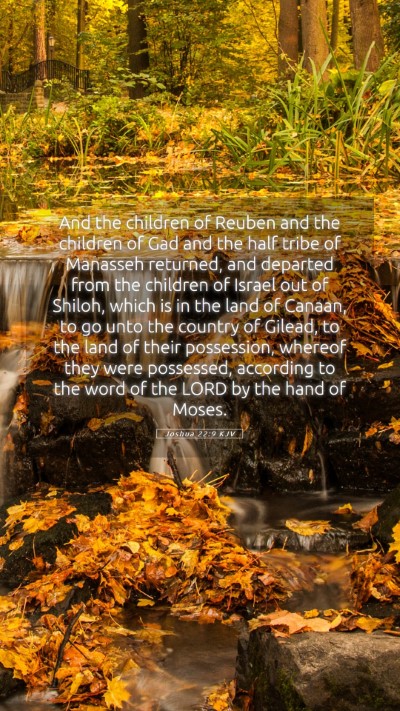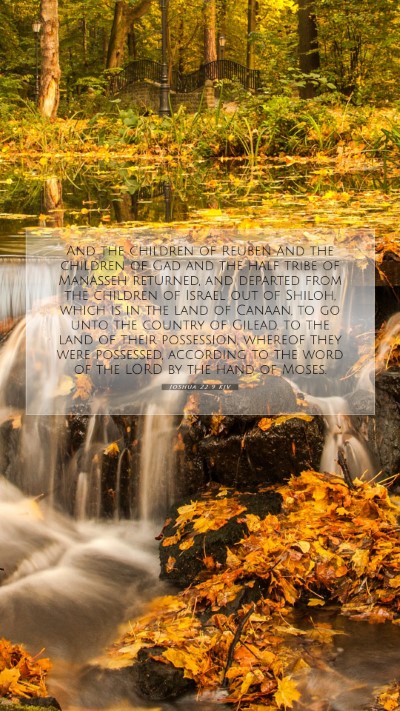Bible Verse Meaning: Joshua 22:9
Joshua 22:9 states, "And the children of Reuben and the children of Gad and the half tribe of Manasseh returned, and departed from the children of Israel out of Shiloh, which is in the land of Canaan, to go unto the country of Gilead, to the land of their possession, whereof they were possessed, according to the word of the LORD by the hand of Moses."
This verse marks a significant moment where the tribes of Reuben, Gad, and half of Manasseh depart from the main body of Israelites after the conquest of Canaan. The meaning and implications of this passage can be explored through various facets provided by public domain commentaries.
Understanding the Context
Before delving into the verse itself, understanding its historical context is essential. The tribes of Reuben, Gad, and the half-tribe of Manasseh had chosen their inheritance on the eastern side of the Jordan River, which caused initial concern among the other tribes (as discussed in Albert Barnes's commentary). This passage is also a culmination of their fulfillment of promises made to assist their brethren in the conquest of Canaan before settling in their chosen lands.
Key Insights from Commentaries
-
Matthew Henry notes that these tribes, while eager to settle in their lands, had shown their commitment to their responsibilities by joining in battles previously, indicating that faithfulness is critical even in separation.
-
Albert Barnes emphasizes the importance of obedience to God’s direction as a shared theme among the tribes. Their return highlights the fulfillment of God's promise and the need for unity among God’s people.
-
Adam Clarke provides cultural context, explaining that these tribes were significant as they represented a unique balance between the physical land and spiritual obligations, showcasing the dual aspects of inheritance in God’s plan.
Lessons from Joshua 22:9
-
Obedience to God: The departure of these tribes underscores the concept of following divine guidance and fulfilling one's promises, which is foundational to understanding Scripture.
-
Importance of Unity: Even amidst physical separation, the tribes’ cooperation during battles speaks to the broader theme of unity within the body of believers (Ephesians 4:3).
-
Faithfulness: Their journey could symbolize the faithfulness required from all believers to carry out God's plans. Each tribe had a role, illustrating that every member of the faith community has contributions to make.
Applications to Daily Life
This verse can inform modern believers by emphasizing the importance of maintaining unity in the faith while also understanding one’s personal call. Whether in Bible study groups or personal devotion, it challenges individuals to assess their commitments both to God and their fellow believers.
Related Scripture
- Numbers 32:20-22: Discusses the agreement of the tribes to help their brethren before settling.
- Deuteronomy 3:12-20: Provides insight into the inheritance of the tribes east of the Jordan.
- Joshua 1:12-15: Reminds us of the leaders’ promises concerning their participation in the conquest.
Conclusion
In summary, Joshua 22:9 presents rich material for biblical exegesis and study. It serves as a powerful reminder of obedience, unity, and faithfulness that transcends the boundaries of physical inheritance.
These insights can greatly enrich the understanding of Central themes found in the Old Testament and their applicability in contemporary life, making it a vital component of Bible study insights and Bible verse explanations.


